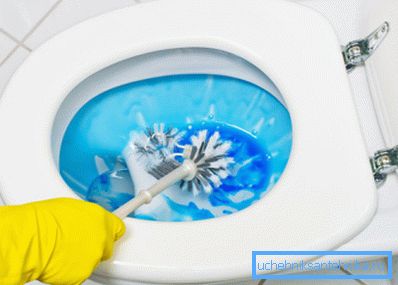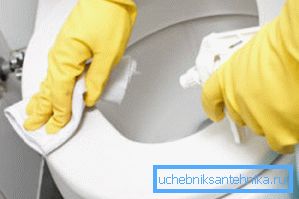How to wash the toilet: useful tricks to achieve perfect
Any housewife or owner of the questions about how to properly wash the toilet, usually does not arise. And yet, despite the seeming simplicity of the problem, the result is different for everyone.
So that the result of many hours of effort does not disappoint you, you should get acquainted with some useful tips before starting work. The significant part of our article will be devoted to them.

What do we need to work?
Devices for washing
Choosing what to wash the toilet, we usually stop at a simple rag (preferably worse, so as not to be sorry to throw it away). In fact, it is worthwhile to prepare a small set of equipment that will greatly facilitate the task ahead of us.

So, we will need:
- Rubber gloves of sufficient density: they will protect us from the effects of chemical reagents, and infections will not allow penetration to the skin.
Note! If you have open sores or skin rashes on your hands, it is better to postpone the process of cleaning the toilet until complete recovery or delegate to someone.
- The brush for a toilet bowl on a long strong handle with rather rigid synthetic bristles. The longer the bristles, the easier it will be to wash the dirt from the far corners.

- A set of sponges with a rigid surface on one side. Such sponges greatly simplify the removal of dirt, and if necessary they can scrape off the dried dirt.
- Spray for surface treatment - we will use it to wash the toilet outside.
Also, it will not be superfluous to purchase a special cloth with a good absorbency: with it, we rub the toilet bowl dry after the cleaning is completed.
Detergents
Naturally, we need and means for washing the toilet. To date, their range is very extensive, so it is worth choosing based on their own preferences. And we in the table below describe the main types of such compounds:

| Facilities | Features of use |
| Powders |
|
| Gels |
|
| Cream formulations |
|
| Liquids |
|
Naturally, the mentioned compositions act only on common pollutants. So if you, for example, soiled plumbing paint, then you need to remove it with an appropriate solvent.

But how to flush mercury from the toilet, where it is sometimes drained, disposing of broken thermometers - this is a much more serious question. You will not be able to try to solve this problem with your own hands. This task is better “left at the mercy of” to professionals who will perform plumbing processing with special compositions based on hydrochloric acid.
Note! And best of all, if you do not try to flush mercury down the drain. It will not get into the pipes anyway: it will remain at the bottom of the hydraulic seal and will gradually evaporate, poisoning the air in the bathroom.
Using popular recipes
Many, seeking to minimize the use of overly aggressive means, are interested in what to wash the toilet without chemistry.
Of course, we will not do without chemicals at all, but something can be found:
- Coca-Cola and other beverages containing organic acids are good for the plaque.. They have a sparing effect and can literally remove calcareous deposits on faience surfaces in just half an hour.
- Preventive cleaning can be done using mustard powder.. Substances that are part of the mustard, are actively fighting microbes, which helps to maintain the sanitary condition in the bathroom.
- If you are looking for, than to wash the toilet at home with heavy pollution, then ordinary kitchen soda will help. Reacting with water, it releases soluble bases that destroy the layer of dirt on the walls.
Tip! For the soda to work, it is better to fall asleep in the toilet at night: then there will be enough time for the reaction.
Toilet bowl wash
Internal processing
It is necessary to begin to wash a toilet in advance, it is desirable - in the evening on the eve of the beginning of cleaning.
The instruction will be as follows:
- Before you wash the toilet inside, you need to get rid of layers of limestone. To do this, turn off the water, dry the bowl as much as possible and apply acid-based products on problematic surfaces.

- Instead, the composition can be used "Coca-Cola" or regular soda. In the case of soda, by the way, it is not necessary to drain the water from the water seal, which is very convenient.
- The next morning, take a brush or a hard sponge and remove the remnants of the raid. Thoroughly wash the surfaces by draining water several times.
Now you need to figure out how to wash the toilet at home:
- Apply the detergent in the form of a gel, cream or liquid on the inner surface of the bowl.
- Particular attention is paid to the line under the rim of the toilet. This is exactly the case when the ad is telling the truth: a huge number of bacteria really accumulate there.

- Leave the agent for 15-20 minutes so that its components react as much as possible with the contamination. This is where the advantage of gels and creams manifests itself: they flow down the walls more slowly and the reaction is more active.
- Next, use a brush and begin to process the surface, removing dirt, rust and limescale.
- Stashed stains scrub with a hard sponge, if necessary, using a scouring powder.
Note! The use of steel sponges is extremely undesirable because they damage the enamel very much.
If you perform cleaning work regularly, then applying a detergent alone is enough. But in difficult cases it may require re-treatment.
After washing is completed, we pour out water several times, removing residues of pollution and household chemicals.
External processing
With the inner surface seems to be sorted out. But how to clean the toilet at home outside?

Here, too, everything is quite simple:
- From the spray gun apply to the surface a means for washing plumbing or cleaning glasses.
- After a few minutes, wipe the toilet first with old newspapers (they will absorb the liquid) and then with a dry cloth.
- If necessary, repeat the treatment to give the faience an extra shine.

How to keep the toilet clean?
No matter how simple the procedure, nobody wants to clean the toilet. So it is worth the effort to do it as rarely as possible.
Especially since in order to achieve this goal, there is not much work to do and it is not necessary:
- First, it is worth adjusting the work of the drain mechanism so that water seeps out of it in the minimum amount. So we will ensure the absence of rusty streaks and lime deposits for a very long time.
- Secondly, in the tank itself, you can add special tools for water conditioning. Their composition includes components that bind carbonates, as well as flavors that prevent the appearance of an unpleasant odor.
- Approximately the same tools can be used in the toilet bowl itself.. As a rule, a capsule with a gel or a solid is placed in a special porous body, and after each flushing part of the composition is washed out and into the toilet.

- Also, preventive treatment does not hurt: about once a week, a small amount of detergent can be applied to the faience surfaces, and then drain the water. Thus, most of the pathogens are neutralized.
Conclusion
We hope that now you have figured out how to wash the toilet as efficiently as possible, and what tools you can use. Well, if there are still questions, then the answers to them can be found on the video in this article: it certainly does not reveal any special secrets, but practically everyone will get some useful tricks.